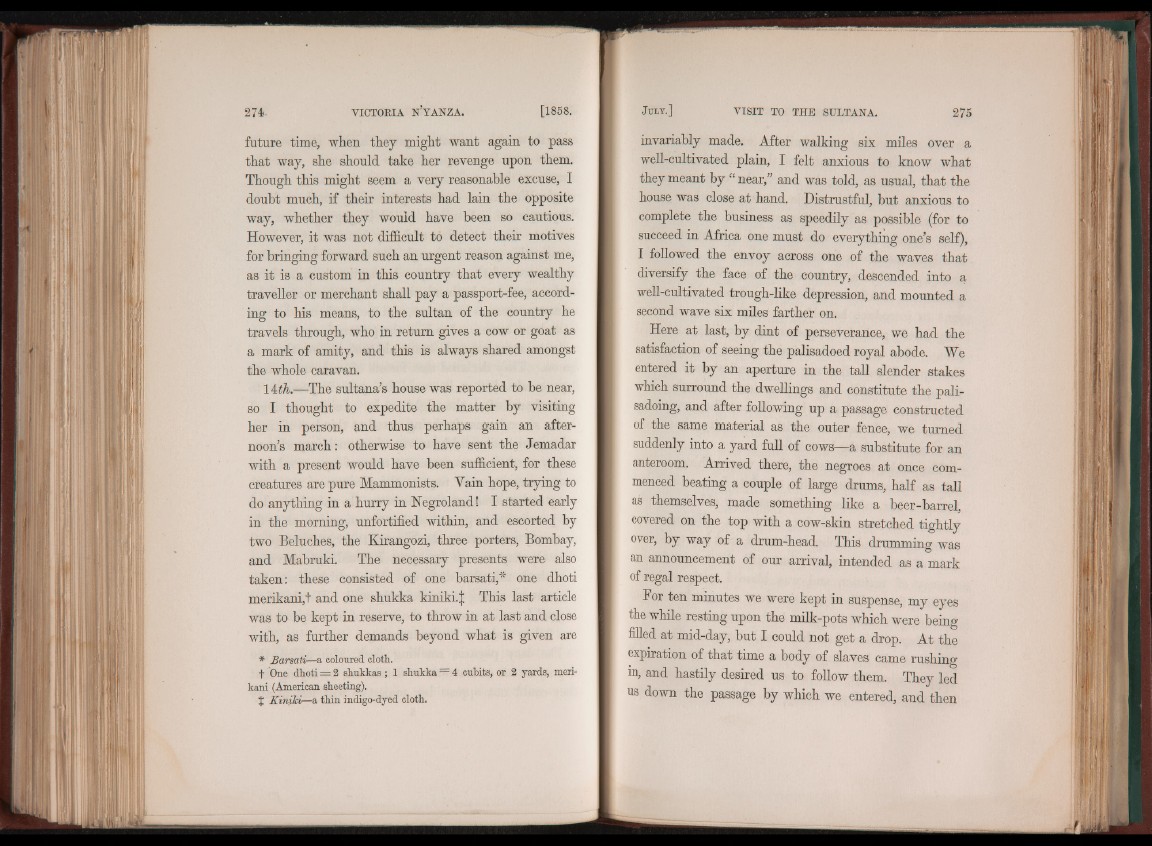
future time, when they might want again to pass
that way, she should take her revenge upon them.
Though this might seem a very reasonable excuse, I
doubt much, if their interests had lain the opposite
way, whether they would have been so cautious.
However, it was not difficult to detect their motives
for bringing forward such an urgent reason against me,
as it is a custom in this country that every wealthy
traveller or merchant shall pay a passport-fee, according
to his means, to the sultan of the country he
travels through, who in return gives a cow or goat as
a mark of amity, and this is always shared amongst
the whole caravan.
14 th.—The sultana’s house was reported to be near,
so I thought to expedite the matter by visiting
her in person, and thus perhaps gain an afternoon’s
march: otherwise to have sent the Jemadar
with a present would have been sufficient, for these
creatures are pure Mammonists. Vain hope, trying to
do anything in a hurry in Negroland! I started early
in the m o rn in g, unfortified within, and escorted by
two Beluches, the Kirangozi, three porters, Bombay,
and Mabruki. The necessary presents were also
taken: these consisted of one barsati,* one dhoti
merikani,+ and one shukka kiniki.| This last article
was to be kept in reserve, to throw in at last and close
with, as further demands beyond what is given are
* Barsati—a coloured cloth.
f One dhoti — 2 shukkas; 1 shukka —4 cubits, or 2 yards, meri-
kani (A-men'can sheeting).
% K iniki—a thin indigo-dyed cloth.
invariably made. After walking six miles over a
well-cultivated plain, I felt anxious to know what
they meant by “ near,” and was told, as usual, that the
house was close at hand. Distrustful, but anxious to
complete the business as speedily as possible (for to
succeed in Africa one must do everything one’s self),
I followed the envoy across one of the waves that
diversify the face of the country, descended into a
well-cultivated trough-like depression, and mounted a
second wave six miles farther on.
Here at last, by dint of perseverance, we had the
satisfaction of seeing the palisadoed royal abode. We
entered it by an aperture in the tall slender stakes
which surround the dwellings and constitute the pali-
sadoing, and after following up a passage constructed
of the same material as the outer fence, we turned
suddenly into a yard full of cows—a substitute for an
anteroom. Arrived there, the negroes at once commenced
beating a couple of large drums, half as tall
as themselves, made something like a beer-barrel,
covered on the top with a cow-skin stretched tightly
over, by way of a drum-head This drumming was
an announcement of our arrival, intended as a mark
of regal respect.
For ten minutes we were kept in suspense, my eyes
the while resting upon the milk-pots which were being
filled at mid-day, but I could not get a drop. At the
expiration of that time a body of slaves came rushing
in, and hastily desired us to follow them. They led
us down the passage by which we entered, and then